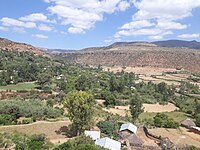Environmental impact of irrigation

Irrigation is the process of using water to make land more suitable for growing crops. It is a necessary part of farming, but it does have an environmental impact. When farmers use too much water for irrigation, it can lead to problems like water pollution, soil erosion, and lower water levels in rivers and streams. The water used for irrigation may come from a river, stream, lake, or reservoir, and pollutants from farming can end up in the water and make it dangerous for wildlife and people. Soil erosion can be caused when irrigation water runs off the land into rivers and streams. It can also happen if the water does not soak into the soil but instead washes away topsoil, leaving bare patches that can't be used for farming. Low water levels in rivers and streams can be caused when too much water is taken out for irrigation, leaving not enough water for animals and other creatures that rely on the water.
Related topics others have asked about:
